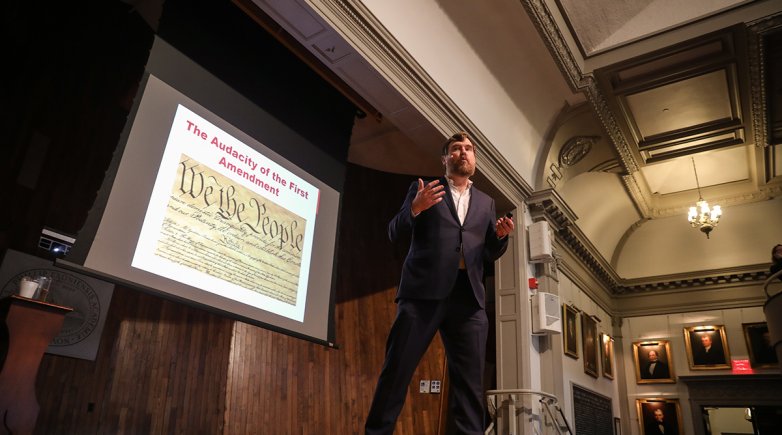Author hails 'the audacity of the First Amendment'
Greg Lukianoff urges Exeter to seek out dissenting views and resist restrictions on free speech.
First Amendment lawyer Greg Lukianoff address assembly Tuesday in Assembly Hall.
Greg Lukianoff has a message for those who might want to restrict free speech, no matter how offensive or distasteful: Be careful what you wish for.
The attorney, author and First Amendment champion told Tuesday’s assembly and a subsequent gathering of Exeter students and faculty in a question-and-answer session that proponents of restrictions might wind up being very disappointed in how they are applied.
“Literally, the point of the First Amendment is to protect minorities of opinion in society,” he said. To limit free speech, even with good intentions, risks those protections.
Lukianoff is the president and CEO of the Foundation for Individual Rights in Education, a nonprofit dedicated to fighting censorship on American college campuses. His third book, written with social psychologist Jonathan Haidt, is called The Coddling of the American Mind, in which the authors state the consequences of restricting dialogue, overprotecting students from dissenting points of view and mediating every dispute.
No matter how well-intended, adults and authority figures “disempowering students and telling them they are less resilient than they actually are” is having the opposite effect. He told assembly a personal story about struggling with depression and “catastrophizing,” or seeing the worst possible outcome as most likely. He credits a process called cognitive behavioral therapy — talking back to one’s most extreme thoughts — for saving his life.
But, mainly, Lukianoff steered clear of the implications of “coddling” to focus on his lifelong passion for free speech and “the audacity of the First Amendment,” the protection of speech, the press, religion, the right to assemble and the right to petition the government.
“In one sentence, we’re trying to get rid of all the things people have been fighting wars over, arresting each other for, massacring each other for, for all of human history.” That is not to be taken for granted, he argues.
In his assembly, Lukianoff laid out factors that threaten free speech on campuses today, including over-regulation and administrative bureaucracy, speech “codes” and “zones,” political correctness and — most distressing for the author — a growing reluctance among student bodies to consider opposing viewpoints. He urged assembly to “make it a lifelong habit to seek out smart people with whom you disagree,” and fight for all free speech — “yours and others.”
In a smaller gathering in Phillips Hall, the author took questions about and weighed in on a variety of free speech topics:
- On intent vs. impact: Today’s society outsizes impact at the peril of open dialogue, Lukianoff said. “If you really want to have a conversation, you have to at least take intent into account.”
- On "cancel culture:" “Social media pats people on the back” for clapping back harshly, but Lukianoff hopes the online culture will eventually see that piling on is beneath us. He called that type of attitude in a high school “toxic.”
- On derogatory language: “You’re allowed to insult people,” he said. “There is no legal requirement for you be nice. And this is actually a good thing, because if there were a requirement to be nice, we’d have to always be nice to the people in charge.”
